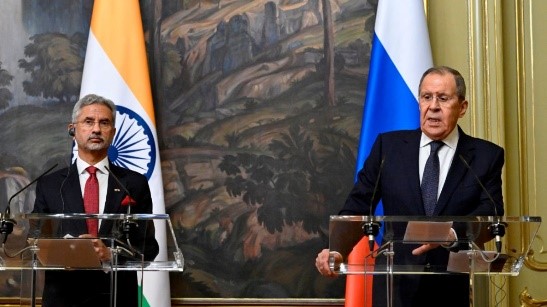
Disclaimer: Copyright infringement not intended.
Context
- External Affairs Minister is on a five-day visit to Russia.
India Russia Relations
Historical Background:
- India and Russia have shared a longstanding and historically close relationship, dating back to the early years of India's independence. The Treaty of Peace, Friendship, and Cooperation signed in 1971 formalized the diplomatic ties, marking the beginning of a robust partnership.
Strategic Partnership:
- The relationship is characterized as a "Special and Privileged Strategic Partnership," emphasizing cooperation in diverse fields. This includes defense, energy, trade, space, and cultural exchanges.
Defense and Military Cooperation:
- The defense cooperation between the two nations is a cornerstone of their partnership. Russia has been a major supplier of military equipment to India. The BrahMos missile, a joint venture between India and Russia, stands as a testament to successful collaboration in defense technology.
Statistics:
- India is one of the largest importers of Russian military hardware, accounting for a significant portion of Russia's arms exports.
Annual Bilateral Summits:
- India and Russia conduct annual bilateral summits, fostering high-level discussions and signing agreements to deepen ties. The 21st India-Russia Annual Summit, held in 2021, continued this tradition.
Space Cooperation:
- Cooperation in space exploration and technology is a notable aspect of the relationship. Russia has been a crucial partner in India's space program, providing support and expertise.
Agreements:
- The two countries have signed various agreements related to space cooperation, including collaboration on satellite launches and technology transfer.
Economic and Trade Relations:
- While defense cooperation is robust, economic ties have room for growth. Both nations express the need to diversify and strengthen economic relations.
- Statistics:
- Bilateral trade between India and Russia was around $9 billion in 2020, with discussions ongoing to enhance economic engagement.

Energy Cooperation:
- Energy cooperation is an emerging dimension, with discussions on oil and gas exploration and a focus on expanding cooperation in the energy sector.
Agreements:
Memoranda of Understanding (MoUs) have been signed to explore cooperation in oil and gas, showcasing the intention to deepen ties in the energy domain.
Cultural and People-to-People Ties:
- Cultural exchanges and people-to-people ties contribute to fostering understanding and friendship. Events, festivals, and educational exchanges play a role in building cultural affinity.
International Diplomacy:
- India and Russia coordinate their positions on various international issues, supporting a multipolar world order. They collaborate in forums like BRICS and the Shanghai Cooperation Organisation (SCO).
Challenges and Opportunities:
- While the relationship is generally strong, India seeks to diversify its strategic partnerships, engaging with multiple countries. This reflects evolving foreign policy priorities and the need to balance relationships in a changing geopolitical landscape.
Way Ahead for India-Russia Relations:
Diversification of Economic Ties:
Strategy:
- Actively work towards diversifying economic collaboration beyond defense. Identify and promote opportunities in sectors like energy, technology, pharmaceuticals, and infrastructure.
Implementation:
- Strengthen trade mechanisms and explore new avenues for economic partnerships, fostering a more balanced and resilient relationship.
Joint Research and Development Initiatives:
- Strategy: Foster joint research and development projects in areas such as space exploration, biotechnology, and information technology.
- Implementation: Encourage academia, research institutions, and industries from both nations to collaborate on cutting-edge technologies, fostering innovation.
Enhanced Cultural and Educational Exchanges:
- Strategy: Intensify cultural exchange programs and educational collaborations to deepen people-to-people ties.
- Implementation: Facilitate more student exchanges, cultural festivals, and artistic events to enhance mutual understanding and appreciation.
Sustainable Energy Cooperation:
- Strategy: Strengthen cooperation in the energy sector, emphasizing sustainable and renewable energy sources.
- Implementation: Collaborate on joint projects, share best practices, and explore partnerships in solar and wind energy, contributing to both countries' energy security and environmental goals.
Infrastructure Development:
- Strategy: Collaborate on large-scale infrastructure projects, leveraging the expertise of both nations.
- Implementation: Jointly invest in and develop infrastructure projects, such as smart cities, transportation networks, and industrial corridors.
Healthcare Collaboration:
- Strategy: Deepen collaboration in healthcare, particularly in pharmaceuticals and medical research.
- Implementation: Facilitate joint research on healthcare solutions, vaccine development, and pharmaceutical production, addressing global health challenges.
People-Centric Initiatives:
- Strategy: Implement initiatives that directly benefit the people, such as skill development programs and health partnerships.
- Implementation: Encourage collaborations in public health, education, and vocational training, enhancing the well-being of the populations in both countries.
Strategic Alignment in Global Forums:
- Strategy: Continue to coordinate positions on international issues in forums like BRICS, SCO, and the United Nations.
- Implementation: Work together on global challenges, advocating for a fair and multipolar world order, and contributing to the stability and effectiveness of international institutions.
.jpg)
Regular Bilateral Dialogues:
- Strategy: Establish regular high-level dialogues to address emerging issues and assess the progress of ongoing collaborations.
- Implementation: Ensure effective communication and coordination between the two nations through consistent diplomatic engagement.
Inclusive Partnerships:
- Strategy: Encourage trilateral and multilateral partnerships that include other nations in joint projects and initiatives.
- Implementation: Explore opportunities for collaborative projects that involve other countries, fostering a broader network of partnerships.
- By focusing on these positive strategies and implementation measures, India and Russia can build a more diversified, resilient, and mutually beneficial relationship, addressing current challenges and unlocking new opportunities for cooperation.
|
PRACTICE QUESTION
Q. How have geopolitical dynamics influenced the trajectory of India-Russia relations, and what strategic implications do these ties hold for India's foreign policy in the contemporary global scenario?
|




